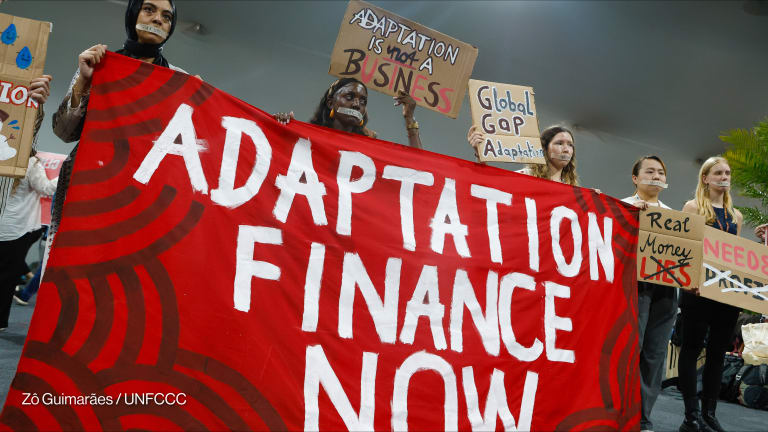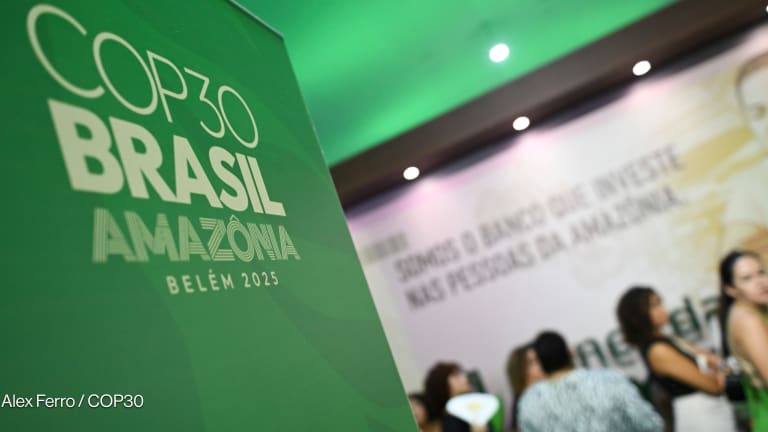
Though last week’s COP 26 summit was a disappointment to some, many WASH advocates say it can be considered a success for the sector — especially as a marker of WASH’s integration into climate conversations and commitments.
“I do think this is a pivotal moment,” Cheryl Hicks, senior advisor to the CEO Water Mandate’s WASH4Work and Water Resilience Coalition initiatives, told Devex. “[WASH] access by nature is less systemic … But when you frame WASH in the context of [climate] resilience, it inherently forces you to take a systems view, which opens up the door for innovation and new thinking.”
“WASH access alone is no longer enough. WASH resilience is the new goal,” Hicks added.
Ahead of the two-week climate event in Glasgow, members of the sector were unsure whether enough of a focus would be placed on the impact of climate change on WASH and WASH systems as potential climate solutions.
Listen to the WASH Works podcast
► Episode 3: WASH as a solution to climate change
► Episode 2: What a lack of water and hygiene can mean for health
► Episode 1: Why women and girls lose the most in the absence of WASH
According to the United Nations Economic Commission for Europe, 90% of extreme weather events impact water — be it through droughts, floods, or storms. Natural disasters can often damage or contaminate water sources, affecting overall water availability. Yet as it stands, only 1% of climate investment goes to protecting and providing WASH services for vulnerable communities.
“I think COP 26 was a critical first step in elevating WASH in conversations about climate action,” Lesley Pories, sector strategy manager at Water.org, said in an email.
In COP’s Water and Climate Pavilion — a first for the summit — a comprehensive schedule of events over the two-week conference explored topics of adaptation, mitigation, partnerships and finance, policy, accountability, and monitoring.
“The Pavilion is just a pavilion, but it does represent a shared agenda, which I think has been absent from the water sector up until very recently,” Jonathan Farr, senior policy analyst at WaterAid, said, adding that while water certainly didn’t dominate, its presence was more significant than in previous years.
A Climate Resilient WASH Day was held on Nov. 6 and Maarten van Aalst, director of the Red Cross Red Crescent Climate Center, said in an email that a host of side events highlighted both the concerns and the solutions around WASH.
Historically, the climate world has too often operated in a silo, van Aalst said, which has meant the sector has been slow to mobilize existing knowledge on WASH to tackle the rising climate risks. But “there is certainly growing awareness and action in these interfaces,” he added, citing Glasgow’s COP as an example.
“In between the COPs, the water sector has been doing quite a bit on climate-resilient WASH, aligning these sectors and exploring the nexus,” said Sareen Malik, executive secretary at the African Civil Society Network on Water and Sanitation. As a result, the space for water has grown exponentially compared to the other COPs, she added.
Listen to "Water & sanitation as a solution to climate change" on Spreaker.
The COP 26 WASH commitments
The launch of the Glasgow Declaration for Fair Water Footprints saw the founding 18 signatories — including governments from both the global north and south, including the Finland, Malawi, Madagascar, Peru, and the United Kingdom, as well as private companies and NGOs — commit to eliminating water pollution and the over-extraction from rivers and aquifers by 2030.
The hope, according to Dorcas Pratt, deputy director of signatory Water Witness International, is that more signatories will join in the coming months.
WaterAid said the Resilient Water Accelerator — a coalition it launched two years ago with the aim of increasing financing for climate adaptation and bringing clean water to 50 million people in Africa and Asia by 2030 — received pledges of support from the U.K., Dutch, and Swedish governments as well as HRH The Prince of Wales’ Sustainable Markets Initiative and the African Development Bank. The accelerator aims to secure $600 million in its first five years.
“WASH access alone is no longer enough. WASH resilience is the new goal.”
— Cheryl Hicks, senior advisor, CEO Water Mandate’s WASH4Work and Water Resilience Coalition initiativesThe pledge over 40 countries made to move away from coal and the declaration to halt and reverse deforestation and land degradation were also important for the WASH sector, Pratt explained, given both issues are underpinned by water.
“The word drought, the word flood, the word[s] glacial retreat, regenerative agriculture, land restoration, forestry, moving away from coal — which is a very water-intensive industry — the fact that all of these things are getting attention is really important for the world’s water,” she said.
For Farr, the most significant announcement however was United States President Joe Biden’s $3 billion commitment toward adaptation, where $1 billion of the public and private finance mobilized will be allocated to climate-resilient water and sanitation services by 2030.
“Although it's nowhere near enough, $3 billion is great to see … It’s turning the giant ship in the right direction,” he said — and further emphasized how entwined the two issues are.
“The journey for us, at this COP and beyond,” Farr said, “is recognizing that we’re not the water sector talking to the climate sector, we’re now part of the climate sector.”
Visit the WASH Works series for more coverage on water, sanitation, and hygiene — and importantly, how WASH efforts intersect with other development challenges. You can join the conversation using the hashtag #WASHWorks.

Search for articles
Most Read
- 1
- 2
- 3
- 4
- 5








